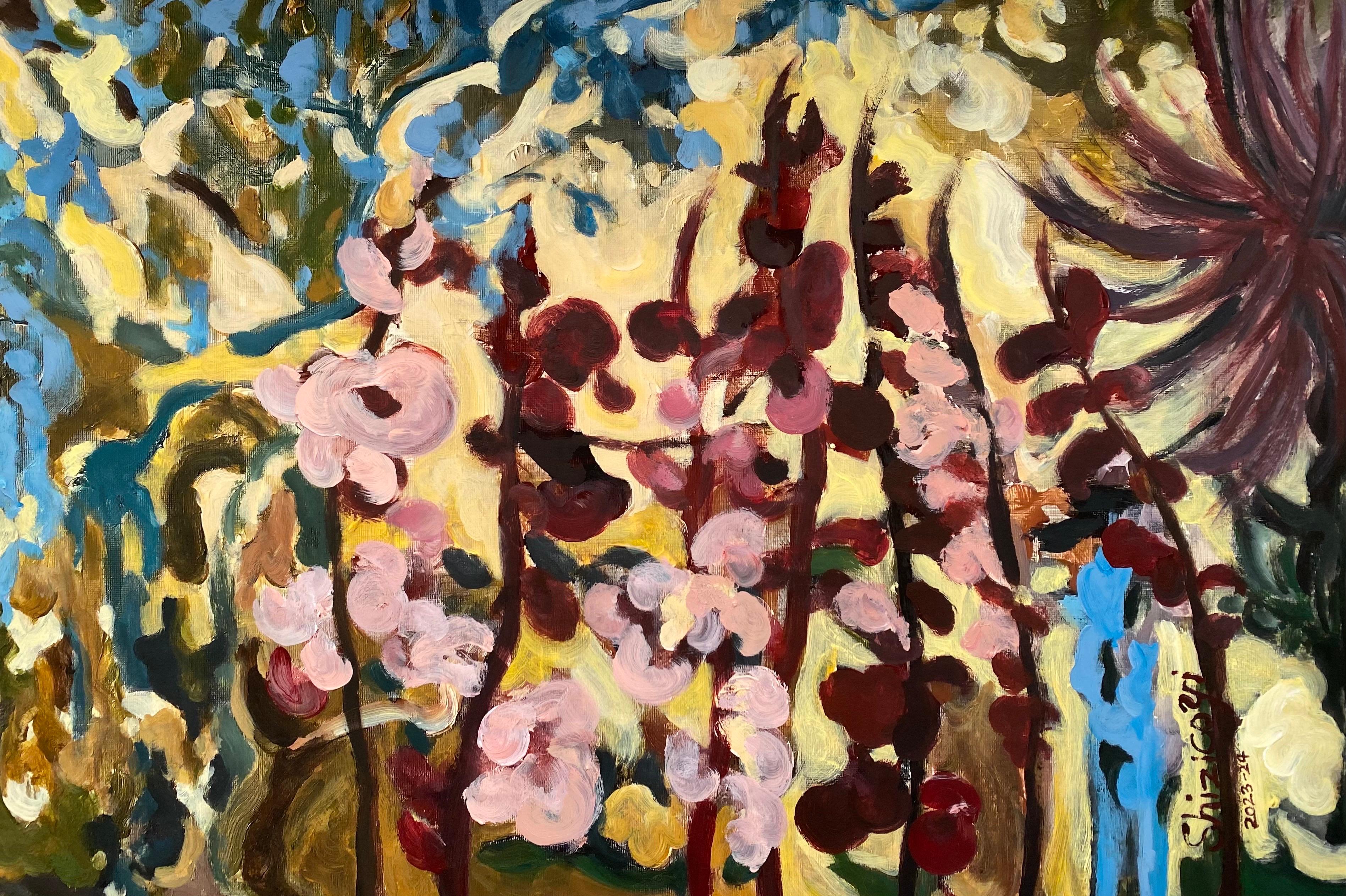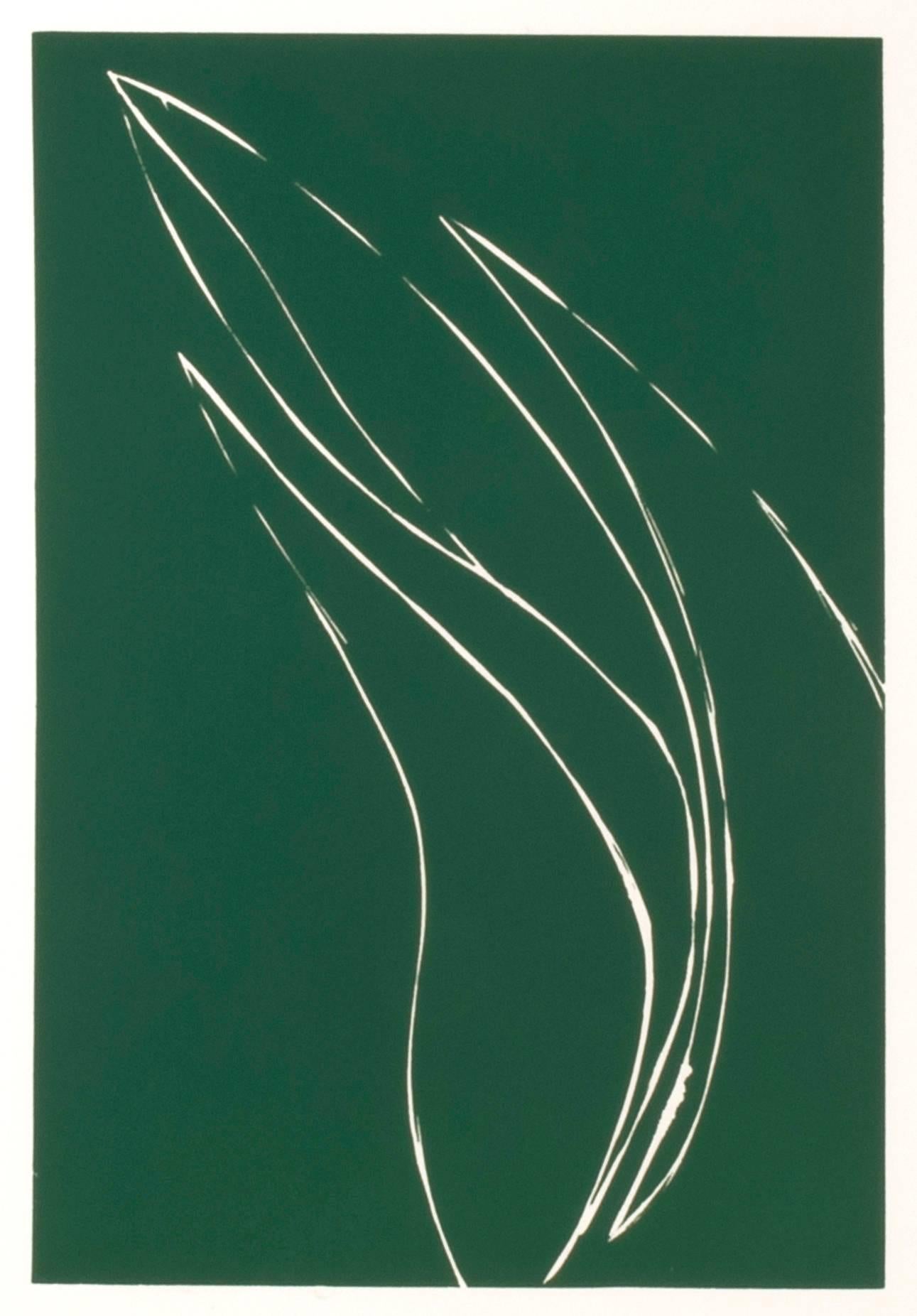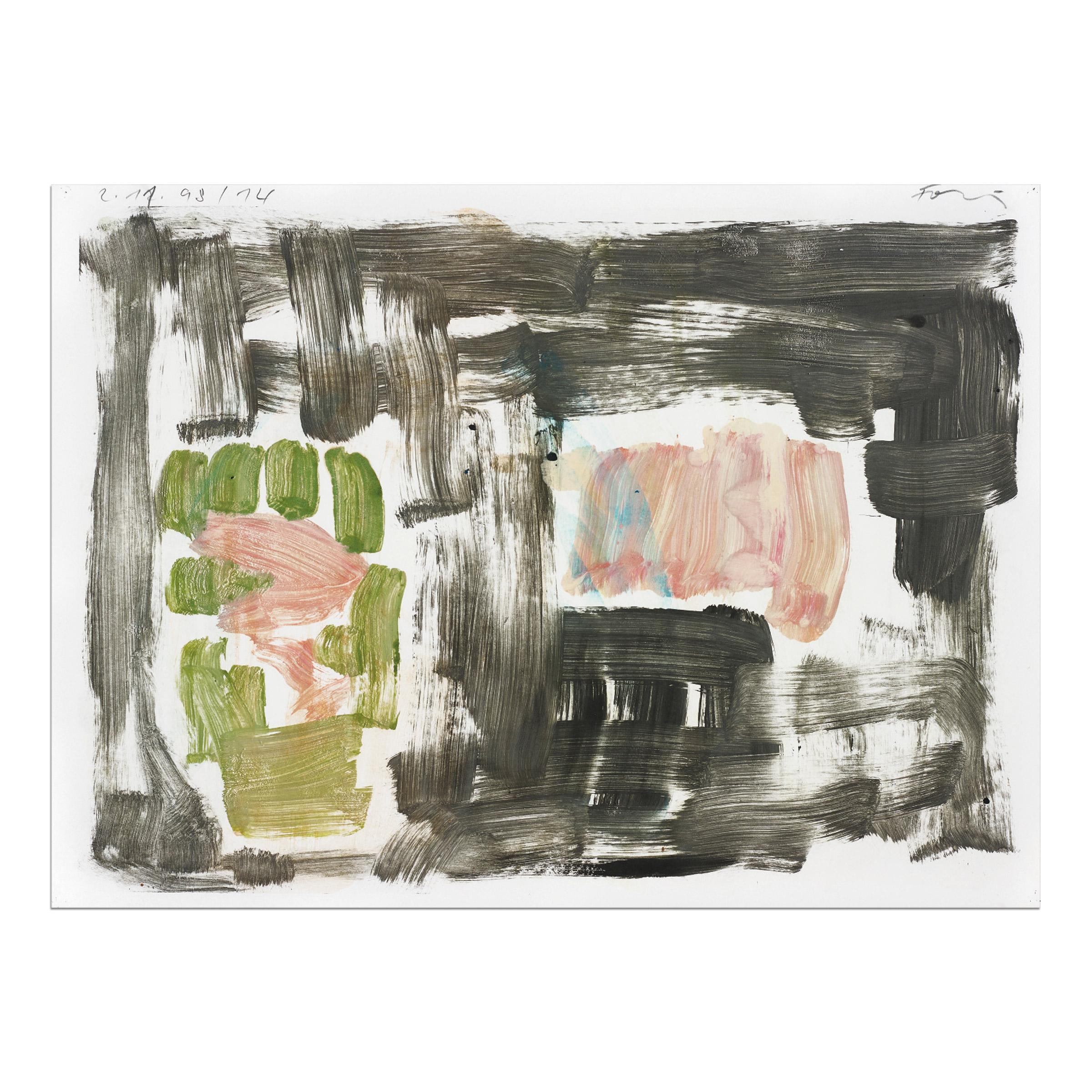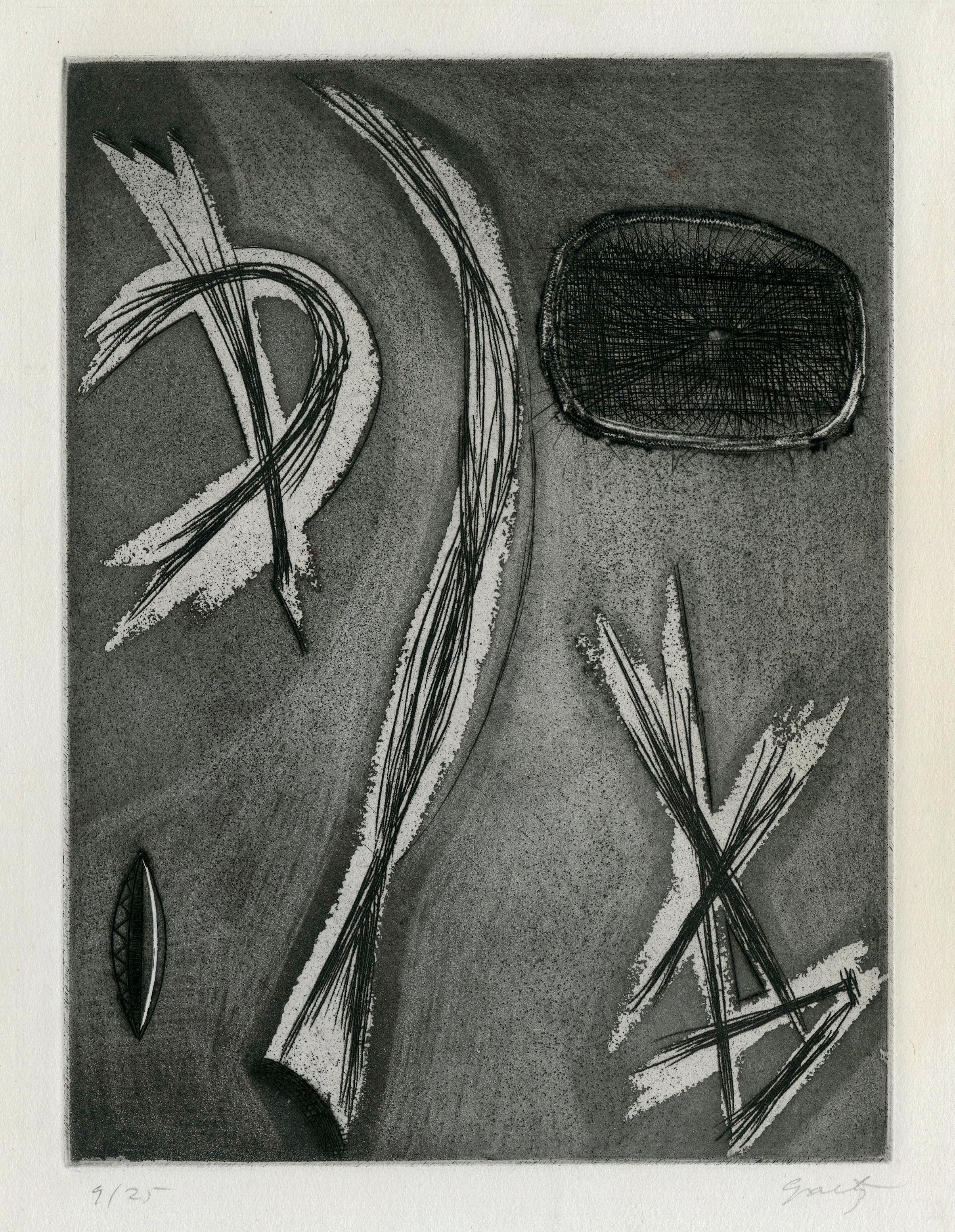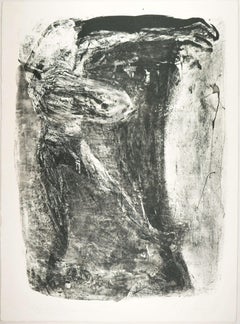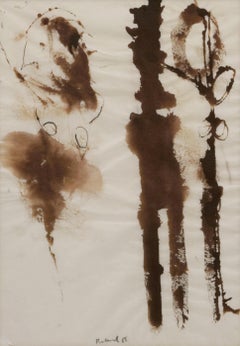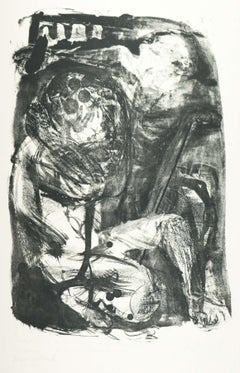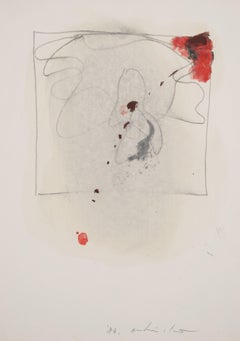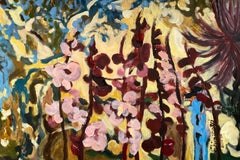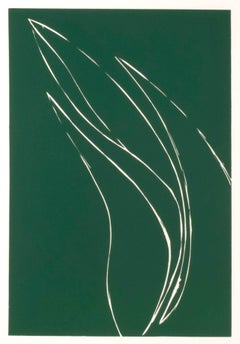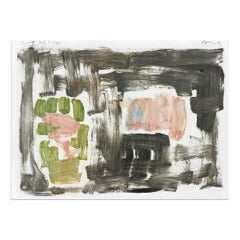Items Similar to Gladioli / - The figurativeness of abstraction -
Want more images or videos?
Request additional images or videos from the seller
1 of 4
Klaus FussmannGladioli / - The figurativeness of abstraction -1983
1983
$550.30
$687.8820% Off
£413.60
£517.0120% Off
€464
€58020% Off
CA$762.45
CA$953.0720% Off
A$828.76
A$1,035.9420% Off
CHF 443.65
CHF 554.5620% Off
MX$10,017.73
MX$12,522.1720% Off
NOK 5,590.81
NOK 6,988.5120% Off
SEK 5,156.18
SEK 6,445.2220% Off
DKK 3,534.65
DKK 4,418.3120% Off
About the Item
Klaus Fußmann (*1938 Velbert), Gladiolen, 1983. Color etching, WVZ 116.5, 14.5 cm x 18.5 cm (depiction), 20 cm x 21 cm (sheet size), signed “Fuß[mann]” in pencil lower right and inscribed “E.A. [Epreuve d'artiste]” lower left. One of ten copies.
- Crease to the lower left corner of the sheet margin, otherwise in excellent condition
- The figurativeness of abstraction -
This intensely colored etching is a rare piece from the beginning of Fußmann's series of flower etchings. This sheet is a variant of Gladioli from 1983, of which only ten copies were produced. In this variant, the black plate, which gives the flower an additional structure, was omitted. However, the flower is not incomplete without it; rather, the artist has made it much more than a color abstraction that shines on its own. Thus, Fußmann created a piece characteristic of his artistic thinking — both abstract and figurative — which displays intense pictorial tension due to this ambivalence.
About the artist
From 1957 to 1961, he attended the Folkwang School in Essen. Then, from 1962 to 1966, he studied under Helmut Lotz at the Berlin University of the Arts. In 1972, he participated in Werner Haftmann's contemporary art exhibition at the Neue Nationalgalerie Berlin, which brought him international recognition. From 1974 to 2005, he was a professor at the Berlin University of the Arts. His students included Yadegar Asisi, Ilja Heinig, Till Warwas, Christopher Lehmpfuhl, and Günther Reger. Fußmann increasingly focused on painting flowers and landscapes, reviving artistic genres that had been neglected in postwar art in the Federal Republic. In doing so, he made a significant contribution to the revitalization of painting.
During his many study trips to India, Australia, New Zealand, the Galapagos Islands, and Germany, he found constant artistic inspiration.
As a critic and theorist, Fußmann wrote several works on art: Die verschwundene Malerei (1984), Essays zur zeitgenössischen Kunst (1985), and Die Schuld der Moderne. Essays on Postmodernism (1991), and Wahn der Malerei (2005).
GERMAN VERSION
Klaus Fußmann (*1938 Velbert), Gladiolen, 1983. Farbradierung, WVZ 116.5, 14,5 cm x 18,5 cm (Darstellung), 20 cm x 21 cm (Blattgröße), unten rechts in Blei mit „Fuß[mann]“ signiert und unten links als „E.A. [Epreuve d'artiste]“ ausgewiesen. Eines von zehn Exemplaren.
- Knickspur an der linken unteren Ecke des Blattrandes, ansonsten in ausgezeichnetem Zustand
- Die Figürlichkeit der Abstraktion -
Bei der farbintensiven Radierung handelt es sich um ein rares Werk aus der Anfangsphase von Fußmanns Blumenradierungen. Das Blatt ist eine in nur zehn Exemplaren angefertigte Variante der in einer Auflage von 50 Stück erschienenen Gladiolen aus dem Jahre 1983. Bei dieser Variante wurde die schwarz eingefärbte Platte weggelassen, die der Blüte eine zusätzliche Struktur verleiht. Ihr Fehlen führt allerdings nicht dazu, dass das Bild unvollständig wäre, vielmehr hat der Künstler die Blume weit mehr als eine aus sich selbst heraus leuchtende Farbabstraktion gestaltet. Damit hat Fußmann ein für sein künstlerische Denken charakteristisches, gleichermaßen abstraktes wie figürliches Bild geschaffen, das durch diese Ambivalenz eine intensive Bildspannung aufweist.
zum Künstler
Von 1957 bis 1961 besuchte Klaus Fußmann die Folkwang-Schule Essen und studierte anschließend von 1962 bis 1966 an der Hochschule der Künste Berlin bei Helmut Lotz. 1972 nimmt er an der von Werner Haftmann kuratierten Ausstellung zur aktuellen Kunst in der Neuen Nationalgalerie Berlin teil, was ihm internationale Bekanntschaft verschaffte. Von 1974 bis 2005 war Fußmann Professor an der Hochschule der Künste Berlin. Zu seinen Schüler gehörten Yadegar Asisi, Ilja Heinig, Till Warwas, Christopher Lehmpfuhl sowie Günther Reger. Fußmann konzentriere sich zusehends auf Blumen- und Landschaftsmalerei und belebte damit in der bundesrepublikanischen Nachkriegskunst vernachlässige künstlerische Genres neu und trug wesentlich zur Revitalisierung der Malerei bei.
Auf seinen zahlreichen Studienreisen, die ihn bis nach Indien, Australien, Neuseeland und auf die Galapagosinseln, aber auch durch Deutschland führten, wurde er künstlerisch immer wieder neu inspiriert.
Fußmann verfasste als Kritiker und Theoretiker auch Schriften zur Kunst: Die verschwundene Malerei (1984), Essays zur zeitgenössischen Kunst (1985), Die Schuld der Moderne. Essays über die Postmoderne (1991), Wahn der Malerei (2005).
- Creator:Klaus Fussmann (1938, German)
- Creation Year:1983
- Dimensions:Height: 7.88 in (20 cm)Width: 8.27 in (21 cm)Depth: 0.4 in (1 cm)
- Medium:
- Movement & Style:
- Period:
- Condition:
- Gallery Location:Berlin, DE
- Reference Number:1stDibs: LU2438216369022
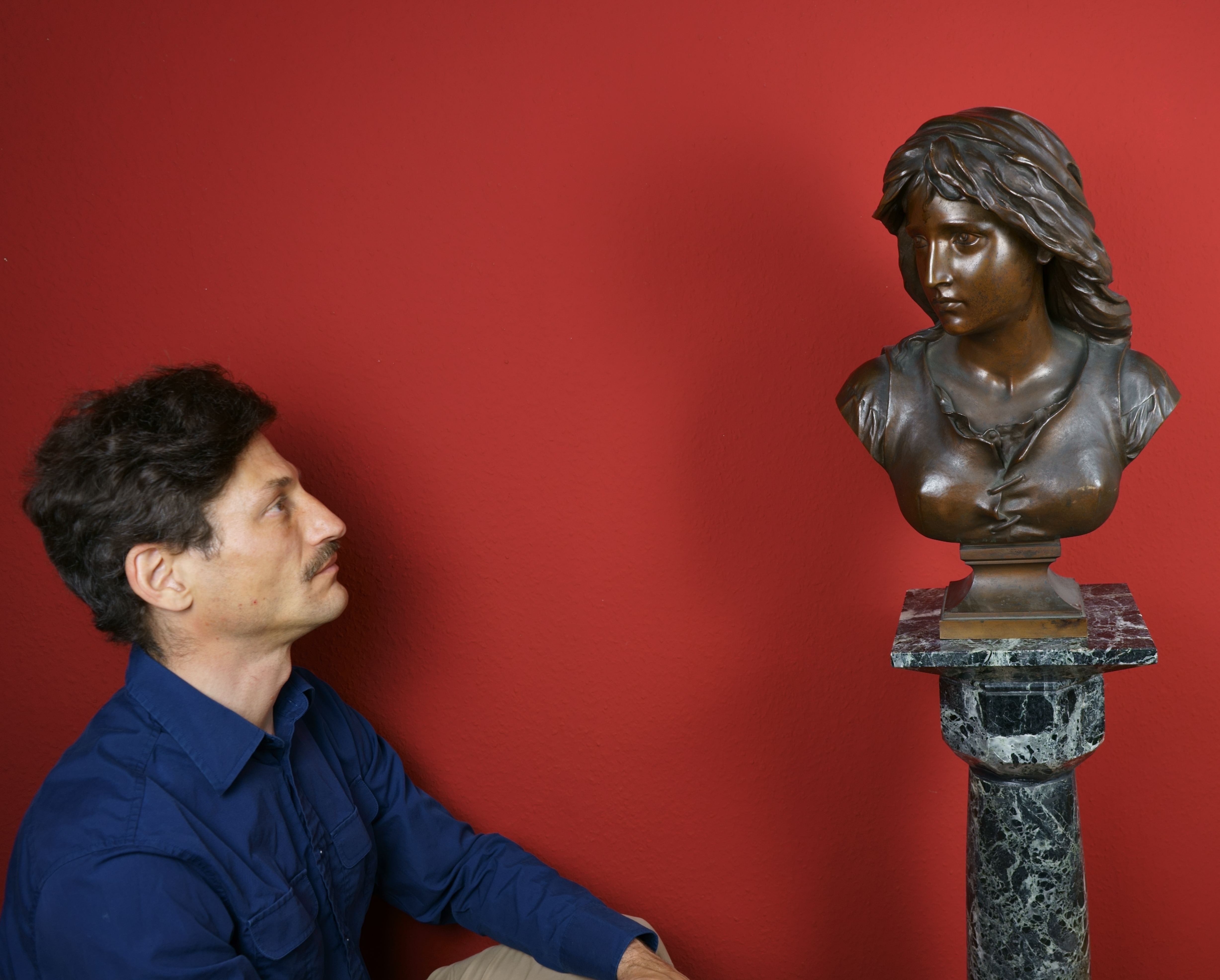
About the Seller
5.0
Vetted Professional Seller
Every seller passes strict standards for authenticity and reliability
Established in 2014
1stDibs seller since 2023
22 sales on 1stDibs
- ShippingRetrieving quote...Shipping from: Berlin, Germany
- Return Policy
More From This Seller
View AllMy treasure, my sanctuary / - A Tortured Treasure -
Located in Berlin, DE
Johannes Heisig (*1953 Leipzig), "My treasure, my sanctuary" - To the Christmas Oratorio by Johann Sebastian Bach. Lithograph on strong yellowish laid paper with watermark, 53 x 39.5...
Category
1980s Abstract Expressionist Figurative Prints
Materials
Lithograph
$360 Sale Price
20% Off
Untitled / - Association -
Located in Berlin, DE
Detlef Baltrock (*1954 Stuttgart), Untitled, 1985. Watercolor, 29.5 cm x 21 cm (visible dimensions), 41 cm x 32 cm (frame), signed “Baltrock” lower center and signed “[19]85”, label ...
Category
1980s Abstract Expressionist Abstract Drawings and Watercolors
Materials
Paper
Threatening to defeat me once and for all / - A Christmas Pietà -
Located in Berlin, DE
Johannes Heisig (*1953 Leipzig), "Threatening to defeat me once and for all" - To the Christmas Oratorio by Johann Sebastian Bach. Lithograph on strong yellowish laid paper with wate...
Category
1980s Abstract Expressionist Figurative Prints
Materials
Lithograph
$360 Sale Price
20% Off
Untitled / - Bleeding Picture -
Located in Berlin, DE
Ouhi Cha (*1945 Busan), Untitled, 1988. mixed media, 31.8 cm x 23.3 cm (sheet size), signed “Ouhi Cha” in pencil below and dated “[19]88”.
- in good condition
- Bleeding Picture -...
Category
1980s Abstract Abstract Drawings and Watercolors
Materials
Paper
Untitled / - The archaism of nature -
Located in Berlin, DE
Jorge Machold (1940 Chemnitz - 2015 Berlin), Untitled, 1973. Color etching, 41.5 x 29.2 cm (plate size), 49.5 cm x 39.5 cm (sheet size), signed lower right in lead “J.[orge] Machold”...
Category
1970s Abstract Abstract Prints
Materials
Paper
Aus dem Totenbuch einer Stadt (IV) - The presence of the submerged -
Located in Berlin, DE
Karl Ludwig Mordstein (1937 Füssen - 2006 Wilszhofen), From the Book of the Dead of a City (IV), 1983. Color etching, copy 16/60, 15.5 x 18.5 cm (imag...
Category
1980s Abstract Abstract Prints
Materials
Etching
$370 Sale Price
20% Off
You May Also Like
Hand Painted Large-Gladiolus Glorious-British Awarded Artist-Limited Edition#7
Located in London, GB
This rare X-large Limited Edition is 80% hand painted and highlighted with original paint and brushstrokes painted by artist Shizico Yi.
Only 10 Limited Edition has been made, last ...
Category
2010s Abstract Impressionist Abstract Prints
Materials
Gesso, Archival Ink, Acrylic, Archival Paper, Giclée, Oil
French Iris I
By Donald Sultan
Located in Fairlawn, OH
French Iris I
Reducutve color woodcut, 1982
Unsigned
Stamped verso “Imprimerie Arnera Archives/Non Signe”
From: Tramp Picture series
"The printer was Claude Jinchat at Imprimerie Arn...
Category
1980s Contemporary Still-life Prints
Materials
Linocut
Spring 69
By Nancy Genn
Located in San Francisco, CA
This artwork titled "Spring 69" 1969 is an original color lithograph by American artist Nancy Genn, b. 1929. It is hand signed, titled and inscribed Artist Proof in pencil by the artist. The size is 23.75 x 34.65 inches. It is in excellent condition, it has very small marks in the back due to tape removal from previous framing, not visible from the front.
About the artist:
Nancy Genn is an American artist living and working in Berkeley, California known for works in a variety of media, including paintings, bronze sculpture, printmaking, and handmade paper rooted in the Japanese washi paper making tradition Her work explores geometric abstraction, non-objective form, and calligraphic mark making, and features light, landscape, water, and architecture motifs. She is influenced by her extensive travels, and Asian craft, aesthetics and spiritual traditions.
Genn's first noted solo exhibition was in 1955 at Gump's Gallery in San Francisco. She received international recognition through her inclusion in French art critic Michel Tapié’s seminal text Morphologie Autre (1960), which cited her as one of the most important exponents of post-war informal art. Her abstract expressionist paintings of this period, continuing through the mid-1970s, featured all-over compositions of colorful layers of gestural brushwork and calligraphic mark making resembling asemic writing.
In 1961, Genn began creating bronze sculptures using the lost-wax casting method. Influenced by noted sculptor and family friend Claire Falkenstein, who used open-formed structures in her work, Genn cast forms woven from long grape vine cuttings, and produced vessels, fountains, fire screens, a menorah, a lectern, and, notably, the Cowell Fountain (1966) at UC Santa Cruz. In 1963 her sculptural work was exhibited with Berkeley artists Peter Voulkos and Harold Paris in the influential exhibition Creative Casting curated by Paul J. Smith at the Museum of Contemporary Crafts, New York.
Genn was one of the first American artists to express herself through handmade paper, first receiving wide recognition via exhibitions at Susan Caldwell Gallery, New York, beginning in 1977, and in traveling exhibitions with Robert Rauschenberg and Sam Francis. In 1978-1979, supported by the National Endowment for the Arts and Japan Creative Arts Fellowship, she studied papermaking in Japan, visiting local paper craftspeople, working in Shikenjo studio in Saitama Prefecture,[5] and exhibiting her work in Tokyo. She also learned techniques from Donald Farnsworth...
Category
Early 20th Century Abstract Expressionist Abstract Prints
Materials
Lithograph
Günther Förg, Untitled Monotype
By Günther Förg
Located in Hamburg, DE
Günther Förg (German, 1952-2013)
Untitled, 1998
Medium: Monotype in colors, on wove paper
Dimensions: 56 x 76 cm (22 x 29 7/8 in)
Unique artwork: Hand-signed, dated ‘2.11.98’ in ...
Category
20th Century Abstract Abstract Prints
Materials
Monotype
Untitled
By Henri Goetz
Located in Fairlawn, OH
Untitled
Engraving, drypoint & carborundum, c. 1960's
Signed and numbered in pencil (see photos)
Edition: 25 (9/25)
Printed by the artist
Condition: Adhesive residue on the verso to...
Category
1960s Abstract Expressionist Abstract Prints
Materials
Engraving
Gladiolus
Located in Zofingen, AG
In this energetic piece, I've unleashed a symphony of vibrant colors and passionate strokes to celebrate life's vivacity. Merging expressionism with a touch of pop art, I've used acr...
Category
2010s Expressionist Still-life Paintings
Materials
Oil Pastel, Acrylic, Satin Paper
More Ways To Browse
Dior Hat
Dior Vintage Hat
John Lander Poster
Joop Vegter
Judith Gaulke On Sale
Keika Hasegawa On Sale
Keith Haring Flowers
Kotozuka Eiichi
Lee Lerfald
Paul Rand Posters
Renaissance Shop New London Nh
Sarah Ann Drake
Some Of My Best Friends Are Pigs
Susan Noble
Terence Millington
Vegetables Matisse
Wayne Thiebaud Poster
Angel Of Victory
